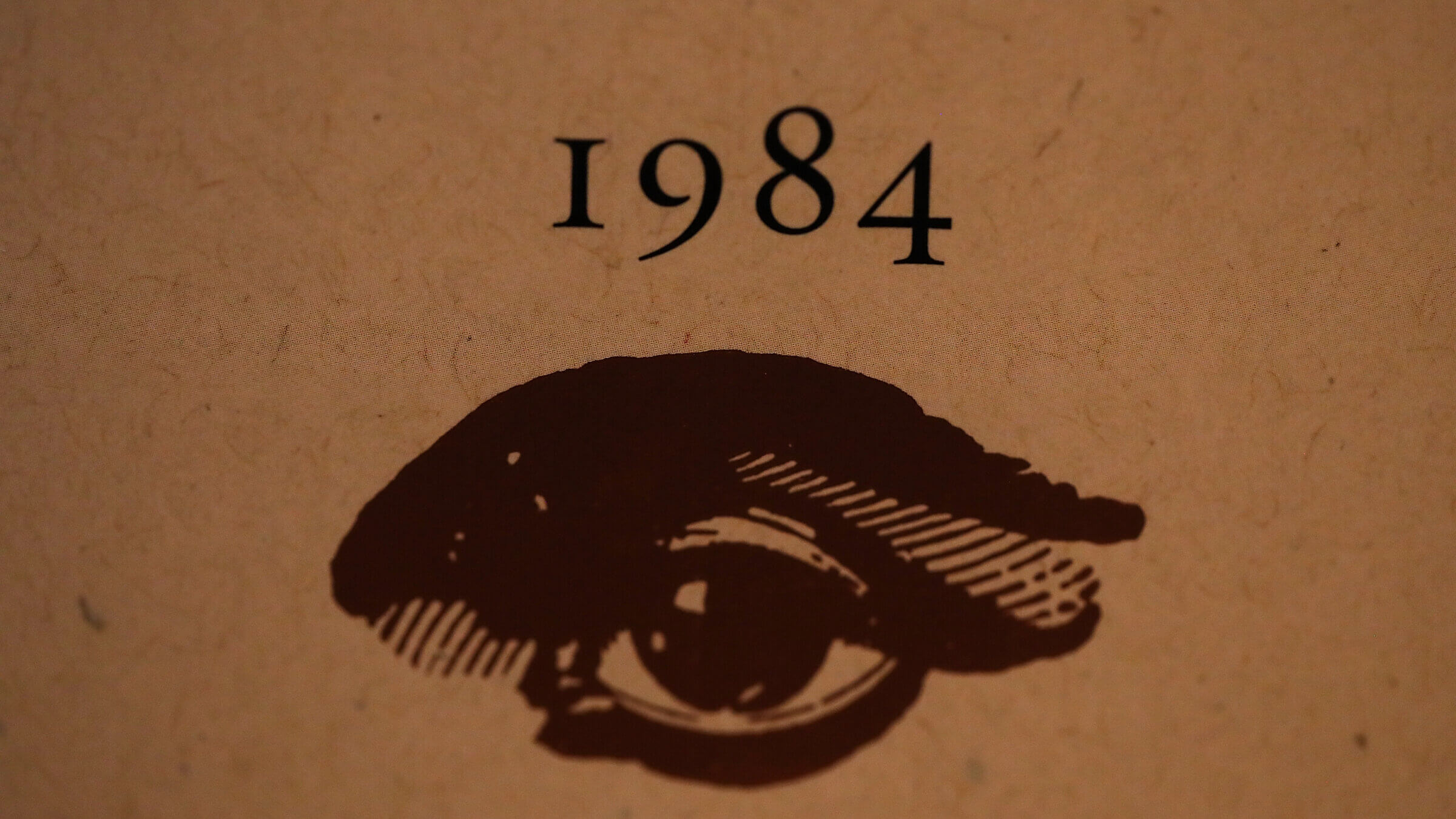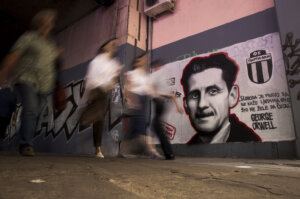Following an Orwellian ‘Liberation Day,’ is a doublethinking America on its way to becoming another Oceania?
75 years after his death, George Orwell would have recoiled at Trump’s toxic blend of nationalism, totalitarianism and antisemitism

A copy of George Orwell’s novel 1984. Photo by Getty Images
There is a riveting moment in George Orwell’s novel 1984 when Winston Smith, a citizen of the totalitarian state of Oceania, opens a poorly bound book with fraying pages. Reading this work, The Theory and Practice of Oligarchical Collectivism by a certain Emmanuel Goldstein, Smith soon comes upon this passage:
The very word “war”…has become misleading. It would probably be accurate to say that by becoming continuous war has ceased to exist…It is unreal [but] it is not meaningless. it helps to preserve the special mental atmosphere that a hierarchical society needs…it is now a purely internal affair…waged by each ruling group against its own subjects, and the object of the war is not to make or prevent conquests of territory, but to keep the structure of society intact.
At this point, Orwell tells us, Smith stops reading and looks up.
Similarly, we too should stop what we’re doing and look up at our nation here in 2025, the very same year that marks the 75th anniversary of Orwell’s death. America has yet to become Oceania — in 1984, North America anchors this global empire — but we are slouching in this direction. By turning not just to the text, but also to the darkening context during which Orwell drafted it, we might better appreciate the crisis we now confront.
Orwell first had the idea for the novel when the war was drawing to a close and the reality of the death camps was just beginning to dawn. Weakened by tuberculosis (worsened by chain smoking), worried over his precarious financial situation, and burdened by his wife’s recent and sudden death, Orwell moved with his sister and adopted son to a friend’s remote house, named Barnhill, on the equally remote island of Jura off the western coast of Scotland.
Here, Orwell found the isolation to write, but he was not isolated enough to escape the rumors of war. They conveyed not just the mind-confounding magnitude of the war’s destruction — climaxing with the liberation of the death camps and bombings of Hiroshima and Nagasaki — but also reminded Orwell of the equally boggling means by which this destruction was achieved.

Given the festering of antisemitism in England, Orwell was not surprised by these rumors. While Orwell had not been immune to “polite” antisemitism, this prejudice began to evaporate by the late 1930s. He observed how people, particularly workers, “dislike the Jews so much that they do not want to remember their sufferings, and when you mention the horrors that are happening in Germany or Poland, the answer is always, ‘Oh yes, of course that’s dreadful, but’ — and out comes the familiar list of grievances.”
This response is not unlike those who cluck their tongues when a legal resident in our country is hustled away by masked officers in an unmarked van, but still believe other immigrants are poisoning our blood. But there is more. Whenever the BBC announced yet another Nazi atrocity, Orwell paid attention to the reaction of the public. “What impresses me,” he wrote, is that “every case is believed in or disbelieved in according to political predilection, with utter noninterest in the facts and with complete willingness to alter one’s beliefs as soon the political scene alters.”
These and similar observations reflected Orwell’s increasing fascination with what he called doublethink, which he defined as the “power of holding two contradictory beliefs in one’s mind simultaneously and accepting both of them.” He had already formed the basis for this notion in his previous book Animal Farm (which to his great dismay brought him great fame). As Orwell rightly foresaw, cognitive misfiring was not just a vital ingredient to the success of Soviet communism, but to the efforts of any other aspiring dictator, including the one who blowtorched the global economy on a day he called “Liberation Day.”
Along with antisemitism and totalitarianism, however, there was a third -ism which terrified Orwell: nationalism. In a 1945 essay, Orwell defined nationalism as the “habit of assuming that human beings can be classified like insects and that whole blocks of millions or tens of millions of people can be confidently labelled ‘good’ or ‘bad.’” The first represents those labeled Aryan and the second those who are Semites; or, again, the first applies to those who hail from white and Christian nations and the second applies to those from, say, shithole countries.
These three toxic -isms — nationalism, antisemitism, and totalitarianism — merged in the manuscript that Orwell was relentlessly and desperately pounding out on his battered typewriter in his bedroom in Barnhill. It was with Goldstein’s account of continuous war that Orwell tied these -isms together. Toward the very beginning of the novel, Smith is writing in a (forbidden) journal about a newsreel at the cinema, a description that strikes the reader with the force of a 2×4 slammed across the back of the skull. On the screen, Smith writes that he saw, with neither context nor narrative, a “Jewess” who, sitting in a boat, had wrapped her arms around a child she is trying to protect from a hail of bullets. Suddenly, “a helicopter planted a 20 kilo bomb in among them terrific flash and the boat went all to matchwood then there was a wonderful shot of a child’s arm going up up up right up.”
The audience, having cheered this scene, next sees the “face of Emmanuel Goldstein, the Enemy of the People…There were hisses here and a little sandy-haired woman gave a squeak of mingled fear and disgust. Goldstein was the renegade and backslider who once, long ago (how long ago, nobody quite remembered), had been one of the leading figures of the Party.”
More than a few readers believe that Orwell modeled Goldstein after Leon Trotsky, the “renegade” Bolshevik who broke with Stalin and happened to be of Jewish heritage. While this is conjecture, what is clear is that Orwell, at the very start of the novel, confronts us with the faces of a Jew and a “Jewess.” Whereas Smith has no context for these faces and what they came to represent, Orwell knows that we do. The Orwell scholar Melvyn New has argued that this opening suggests all of humankind are Jews because they are all potentially victims of these same -isms. This might be a bit too parochial, but it does remind us, 75 years after Orwell’s death and the 80th anniversary of Buchenwald’s liberation, that what happened then has happened since and, unless we are vigilant, will happen again. While Orwell often struggled with pessimism about the lot of humankind, he insisted upon the book’s publication that its lesson was clear: “Don’t let it happen. It depends on you.” From his pen to our ears.















